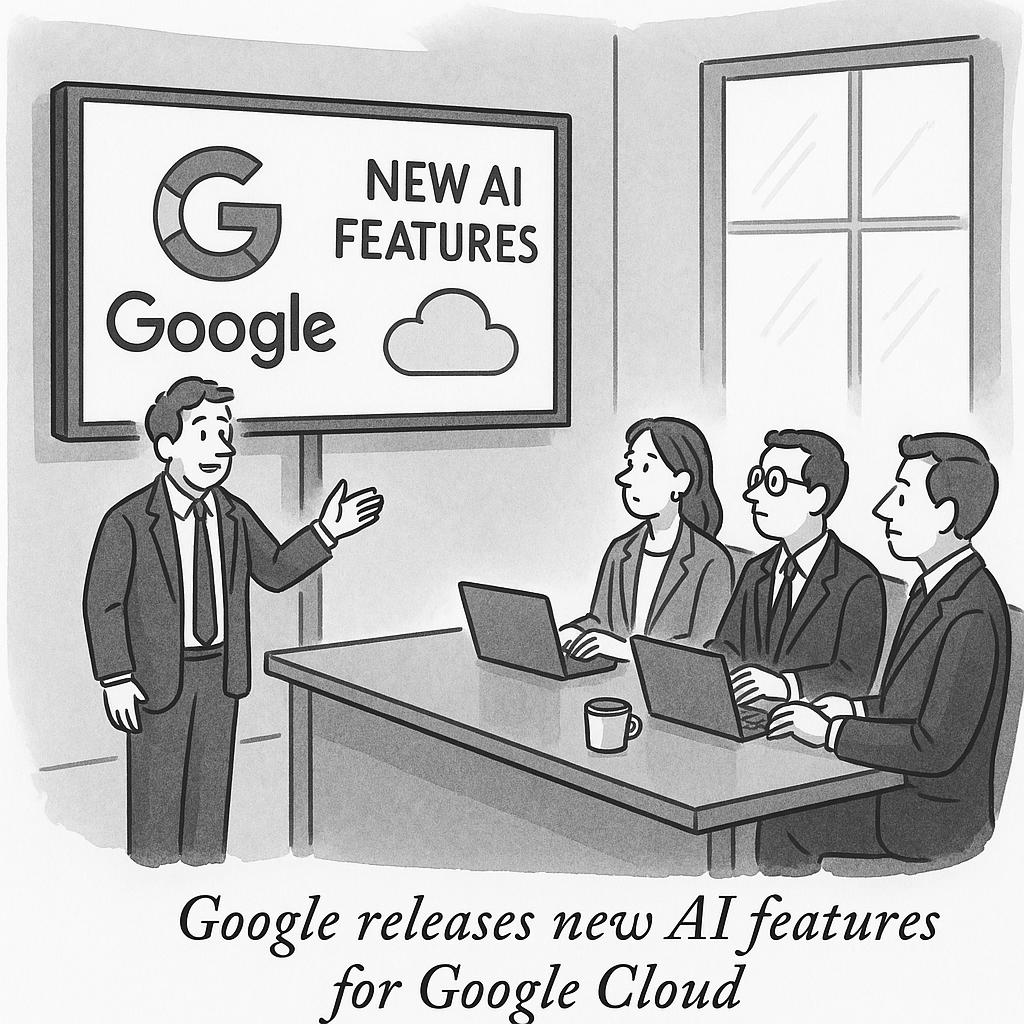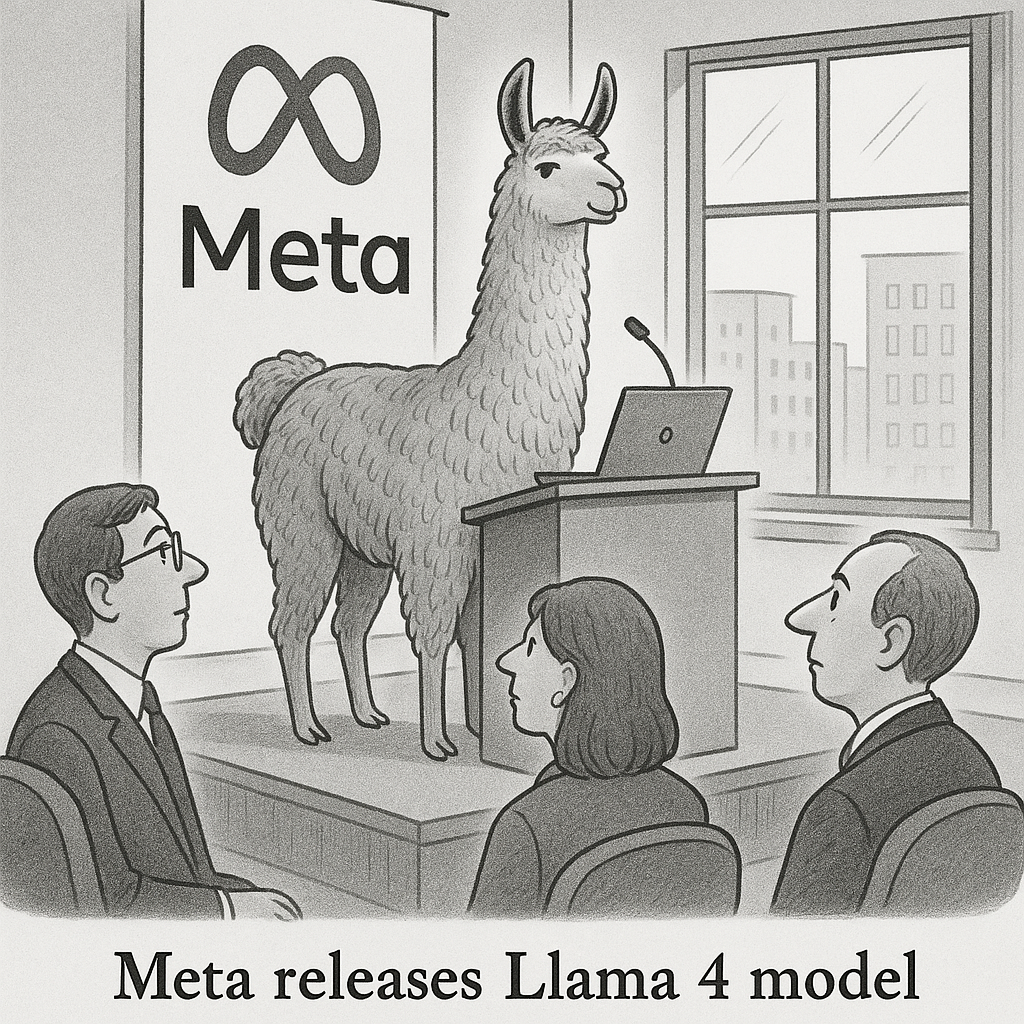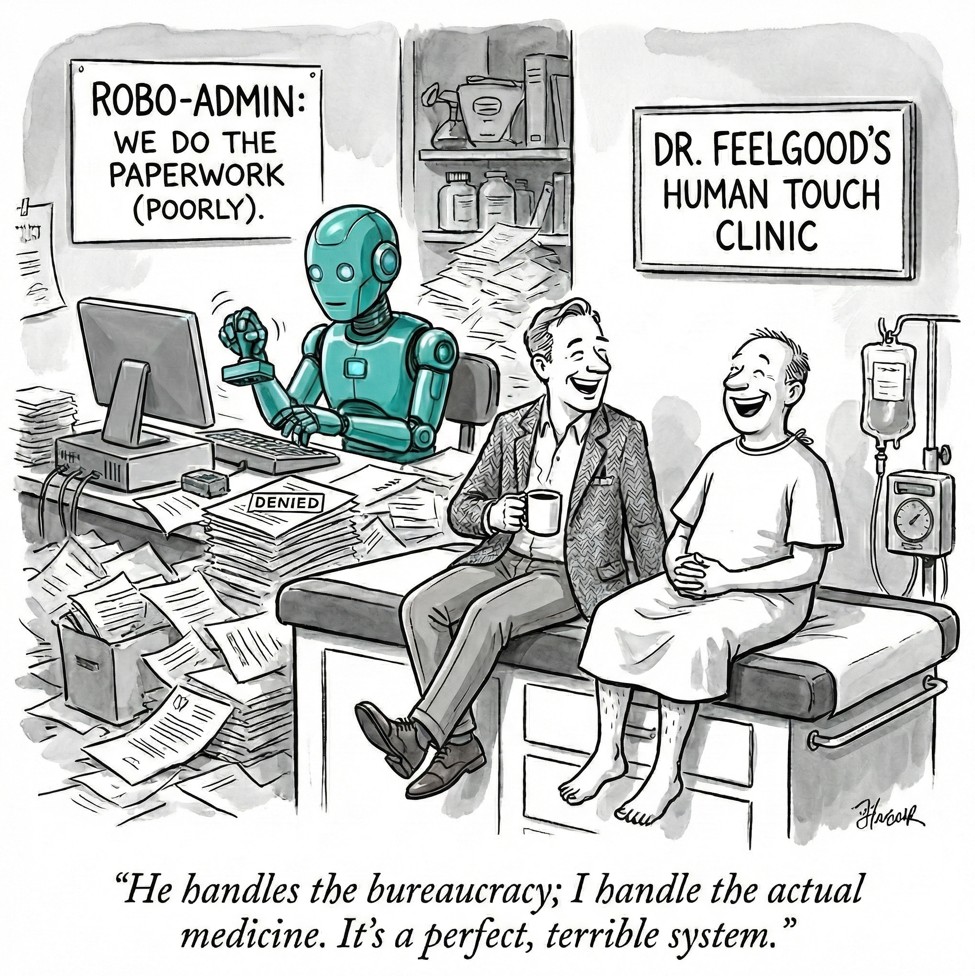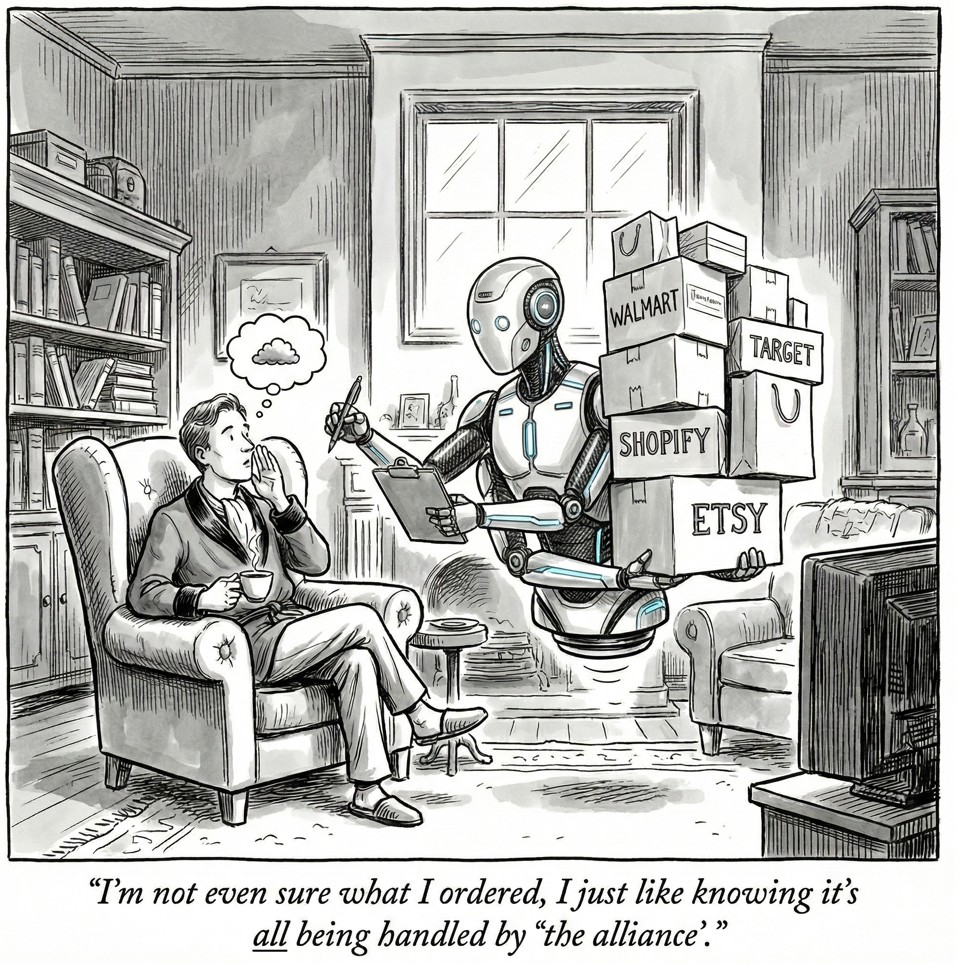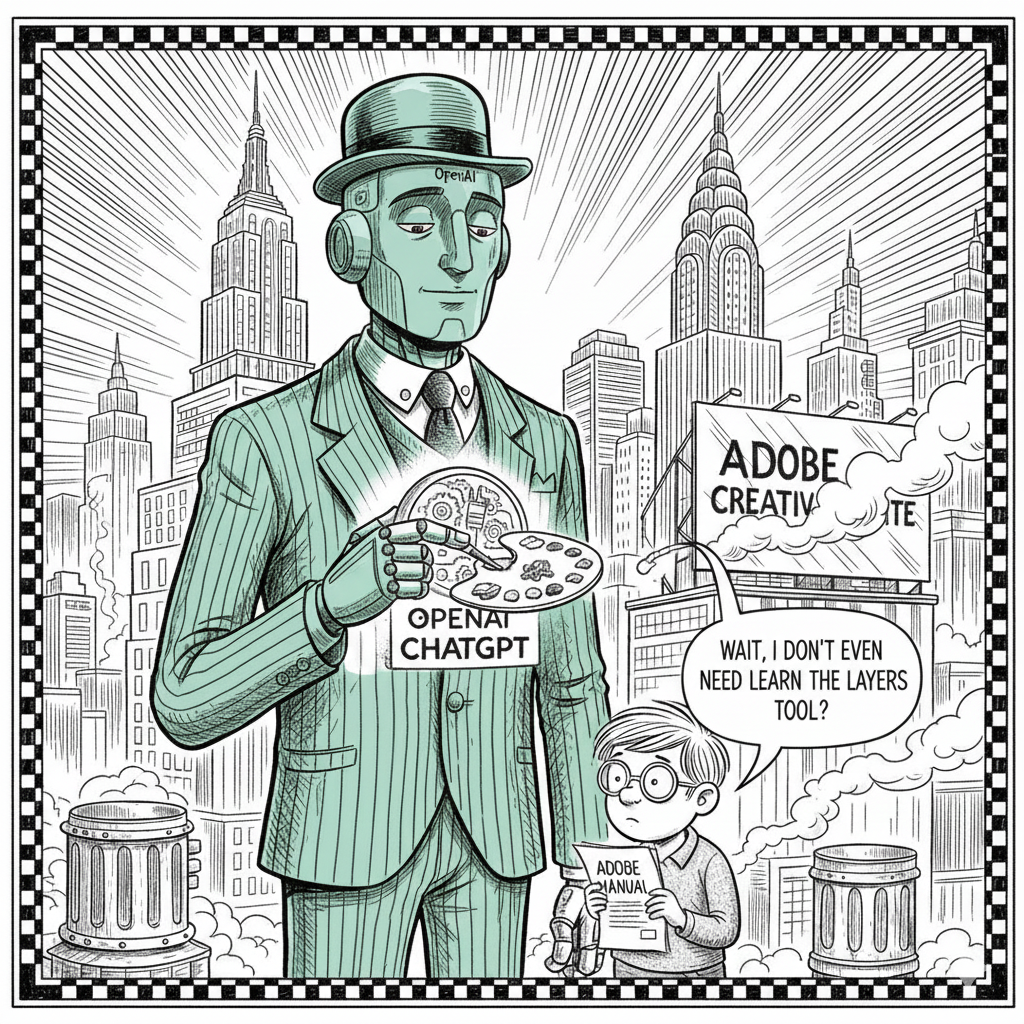Google Cloud Unveils Advanced AI Models, Custom Hardware, and Agent Tools at Next '25
Google Cloud significantly expanded its artificial intelligence portfolio at its annual Next '25 conference
Google Cloud significantly expanded its artificial intelligence portfolio at its annual Next '25 conference, unveiling new AI models, powerful custom hardware, and a suite of tools aimed at accelerating the development and deployment of intelligent AI agents within enterprises. The announcements underscore a strategic push towards making sophisticated AI more practical, reliable, and integrated into core business processes.
Section 1: Expanding the Gemini Frontier
Google introduced notable advancements in its flagship Gemini family of AI models, catering to different enterprise needs for power, speed, and cost-effectiveness.
Subsection 1.1: Gemini 2.5 Pro - Advanced Reasoning Power
The Gemini 2.5 Pro model was highlighted as Google's most intelligent offering to date, designed as a "thinking model" capable of reasoning through complex problems before generating a response.1 This capability is reflected in its top ranking on the Chatbot Arena leaderboard and high scores on demanding reasoning benchmarks like Humanity's Last Exam.1 The model excels in tasks requiring deep analysis, such as advanced coding, debugging intricate code, and extracting key information from dense documents like legal contracts or medical histories.3 Its large 1 million token context window further supports handling extensive information for these complex tasks.5 The emphasis on benchmark performance and #1 rankings serves as a clear competitive positioning tactic, targeting enterprise use cases that go beyond simple question-answering towards multi-step problem-solving and analysis, which are increasingly vital for business AI adoption. Gemini 2.5 Pro is available immediately in public preview through Google's Vertex AI platform, AI Studio, and the Gemini application.1Subsection 1.2: Gemini 2.5 Flash - Speed and Cost-Effectiveness
Alongside the Pro version, Google introduced Gemini 2.5 Flash, described as a "workhorse" model optimized for low latency and cost efficiency.1 Derived from Gemini 2.5 Pro but streamlined, Flash incorporates adaptive reasoning capabilities, often referred to as a "thinking budget" or "test-time compute".1 This allows users to control the depth of the model's reasoning process, enabling a balance between response quality, speed, and operational cost based on the complexity of the user's prompt or specific budget constraints. This feature directly addresses a significant enterprise concern: the often high and unpredictable cost of running powerful AI models at scale.9 By offering a tunable, cost-efficient model that still possesses advanced reasoning abilities, Google aims to broaden the applicability of sophisticated AI to more routine, high-volume tasks, such as real-time summarization, basic coding assistance, function calling, and powering responsive virtual agents in customer interactions.3 Gemini 2.5 Flash is slated for release soon on Vertex AI, Google AI Studio, and the Gemini app.1
Section 2: Powering the AI Future: Ironwood TPU and AI Hypercomputer
A major hardware announcement was the unveiling of Ironwood, Google's seventh-generation Tensor Processing Unit (TPU).1 These custom-designed silicon chips are specifically engineered for AI workloads, with Ironwood optimized particularly for the inference stage – the process of running trained AI models to generate predictions or outputs. Google presented significant performance claims for Ironwood, citing over a tenfold improvement compared to its previous high-performance TPU 10, five times the peak compute capacity, and six times the high-bandwidth memory (HBM) capacity versus the prior generation.11 Compared to its first publicly available TPU from 2013, Ironwood represents a 3,600-fold performance increase.1 At the pod level, configurations with over 9,000 chips can deliver a reported 42.5 exaflops of compute power.8
Beyond raw power, Google emphasized energy efficiency gains, stating Ironwood is 29 times more energy efficient than its first TPU 1 and twice as power-efficient as the preceding Trillium generation.10 This focus on custom silicon represents a key strategic differentiator for Google Cloud. By designing its own hardware, Google can tailor optimizations specifically for its AI models, like Gemini 2.5 8, and workloads, potentially achieving superior performance-per-dollar and energy efficiency compared to relying solely on general-purpose hardware from third parties like NVIDIA (though Google Cloud continues to offer NVIDIA GPUs as well 17).
Ironwood is presented as a central component of Google's enhanced AI Hypercomputer architecture – an integrated system combining hardware, software, and flexible consumption models aimed at optimizing the cost-effectiveness and performance of AI training, tuning, and serving.8 Google claims this architecture allows Gemini 2.0 Flash to achieve 24 times higher intelligence per dollar compared to GPT-4o.8 The specific focus on optimizing for inference 11 signals the growing importance and associated costs of running trained models in production environments, moving into what Google terms the "age of inference".16 Ironwood TPUs are scheduled to become available later in 2025.1
Section 3: Building the Agentic Future: Tools for Intelligent Automation
A significant theme at Next '25 was the advancement of agentic AI – systems capable of reasoning, planning, and using tools to accomplish complex goals autonomously under user supervision.20 Google introduced foundational tools and platforms to facilitate the creation and enterprise adoption of these agents.
Subsection 3.1: Laying the Foundation - ADK and A2A
Google launched the Agent Development Kit (ADK), an open-source framework designed to simplify the process of building sophisticated AI agents and multi-agent systems.2 It aims to reduce the complexity, potentially allowing developers to build an agent with under 100 lines of code.9 The ADK supports the Model Context Protocol (MCP), an open standard initially developed by Anthropic, which provides a unified way for AI models to securely access and interact with various data sources and tools, eliminating the need for custom integrations for each.2
Complementing the ADK, Google introduced the Agent2Agent (A2A) protocol.2 This new, open standard is designed to enable AI agents, regardless of the framework they were built on or the vendor who created them, to communicate securely, exchange information, and coordinate actions across different enterprise applications and systems. Google developed A2A in collaboration with over 50 industry partners, including major players like Salesforce, ServiceNow, Box, and Deloitte, signaling broad interest in interoperability.2 Releasing an open-source SDK (ADK) alongside an open communication protocol (A2A) represents a proactive effort to standardize the emerging field of agentic AI. This approach aims to foster a collaborative ecosystem, reduce vendor lock-in and fragmentation, and position Google Cloud as a central hub for developing and orchestrating multi-agent systems, thereby potentially accelerating enterprise adoption.12Subsection 3.2: Enterprise Adoption - Agentspace and Agent Engine
To bridge the gap between agent development and practical business use, Google announced enhancements to Google Agentspace and introduced Agent Engine. Agentspace serves as a platform where employees can discover, interact with, and even build AI agents.3 Key updates include integration directly into the Chrome browser's search box, allowing users to perform unified enterprise search, analysis, and synthesis across organizational data sources.15 A new no-code "Agent Designer" or "Agent Assembler" enables business users without coding expertise to create custom agents tailored to automate specific tasks or workflows.3 Agentspace also features an "Agent Gallery" for discovering available agents built by Google, internal teams, or partners 3, and includes new pre-built agents like "Deep Research" and "Idea Generation".15 Companies including KPMG and Wells Fargo are noted as early adopters.8
For deploying and managing these agents in production environments, Google introduced Agent Engine, now generally available.27 This fully managed runtime environment within the Vertex AI platform provides enterprise-grade capabilities for testing, releasing, monitoring, and scaling custom-built agents securely.2 Agent Engine integrates natively with Agentspace, providing the necessary infrastructure backbone.10 By offering both a user-friendly front-end (Agentspace) and a robust back-end management system (Agent Engine), Google addresses the full lifecycle of agent adoption, moving beyond developer-centric tools to facilitate broader organizational use and operational control.
Section 4: Vertex AI - The Unified Hub for AI Development
Vertex AI remains the cornerstone of Google Cloud's AI strategy, positioned as the unified platform for building, deploying, and managing AI models and applications.20 Google reported significant momentum, with Vertex AI usage growing twentyfold year-over-year.3
Subsection 4.1: A Comprehensive Generative Media Suite
The Vertex AI Model Garden now offers access to over 200 foundation models, including Google's proprietary models, offerings from third-party partners like Anthropic and Meta (Llama 4 is now generally available 2), and open-source models.2 A key announcement was the addition of Lyria, Google's text-to-music generation model, now available in preview.2 With Lyria joining existing models for video (Veo 2), image (Imagen 3), and speech (Chirp 3), Google claims Vertex AI is the only major cloud platform offering natively integrated generative media models across all four modalities.2 This integration aims to streamline creative workflows, allowing users to generate complete multimedia assets, such as a video with custom background music and voiceover, starting from text prompts within a single platform.19
Google also detailed updates to its existing media models:
Imagen 3: Enhanced text-to-image generation quality, improved inpainting capabilities for repairing or reconstructing parts of images, and higher-quality object removal.2
Veo 2: Now considered production-ready within the Gemini API 7, Veo 2 gains advanced editing features like inpainting (removing unwanted elements) and outpainting (extending the video frame), interpolation, and new camera controls for cinematic effects.2
Chirp 3: Introduces "Instant Custom Voice," allowing the creation of custom voice replicas from just 10 seconds of audio input, along with improved multi-speaker transcription capabilities.2
Google emphasized enterprise safety features across these models, including SynthID for digital watermarking to identify AI-generated content, safety filters to prevent harmful outputs, and copyright indemnity protections.18 This comprehensive, integrated suite positions Vertex AI uniquely for creative industries like marketing, media, and design.
Subsection 4.2: Enhancing Model Management and Reliability
Beyond model capabilities, Google announced several Vertex AI features focused on improving the reliability, manageability, and cost-effectiveness of AI in production.
Grounding: This capability connects AI model outputs to verifiable data sources to improve accuracy and reduce "hallucinations." Google expanded grounding options beyond its Search index to include Google Maps (currently experimental in the US for location-based context 3), enterprise-specific data, trusted third-party data providers (like Dun & Bradstreet, S&P Global 8), and partner vector databases such as Elasticsearch.33 This directly addresses a major barrier to enterprise AI adoption – the need for factual, trustworthy responses.
Vertex AI Model Optimizer: This new feature automatically routes prompts to the most appropriate model (including various Gemini versions, Imagen, or open models like Llama and Mistral) based on user-defined preferences for balancing output quality, response speed, and cost.2 This provides crucial control over the operational expenses associated with running AI models.
Live API: Now in Preview, the Live API enables real-time, streaming interactions with Gemini models using audio and video inputs.2 This opens up possibilities for more dynamic and immersive applications, such as real-time analysis of live feeds or interactive multimodal agents.
Other Enhancements: Google also mentioned new Vertex AI Dashboards for better monitoring of usage, throughput, and latency 2; improved tools for custom model training and tuning 2; a Vertex AI Global Endpoint for improved application resilience via capacity-aware routing across regions 2; and new inferencing capabilities in Google Kubernetes Engine (GKE) designed to reduce serving costs and latency while increasing throughput.8 These features collectively address the practical operational challenges of deploying and managing AI at scale.
Section 5: AI Infusion Across Google Cloud
The conference also highlighted how AI is being embedded across other Google Cloud services, extending beyond dedicated AI platforms.
Subsection 5.1: AI in Google Workspace
Gemini's integration into Google Workspace is already providing over 2 billion AI-powered assists to business users each month.11 Google introduced Workspace Flows, a new capability for automating multi-step business processes across Workspace applications.6 Users can describe the desired workflow in natural language, and Flows leverages AI, potentially including custom-built AI agents called Gems, to research, analyze, generate content, and orchestrate actions across apps like Docs, Sheets, and Drive. This represents a move towards more agentic automation directly within the productivity suite and is rolling out in an alpha program.34
Specific applications also received new AI features: Google Docs gains the ability to generate full audio versions or podcast-style summaries of documents, alongside an AI writing refinement tool.34 Google Sheets gets new AI experiences for automated data analysis and insight generation.6 Google Vids incorporates Veo 2 for AI image generation 15, and Google Chat receives new ways for teams to collaborate with Gemini.15 Embedding AI directly into these widely used tools aims to make AI assistance readily accessible and drive adoption through familiar interfaces.Subsection 5.2: AI for Security and Infrastructure
Google is applying AI to enhance core cloud infrastructure and security operations. The Google Unified Security (GUS) platform, now generally available, integrates security data from across an organization's attack surface and uses AI for analysis, threat detection, and response.3 Building on this, Google introduced two new AI-powered security agents, expected in preview in Q2 2025: an alert triage agent within Google Security Operations that automates the investigation of security alerts, gathers evidence, and provides verdicts 9; and a malware analysis agent in Google Threat Intelligence that examines potentially malicious code.9 Automating these security tasks aims to significantly reduce the manual workload on security analysts.22
On the infrastructure side, Google announced the Cloud Wide Area Network (Cloud WAN), making its extensive global private network – previously used for its own services like Search and Gmail – available to enterprise customers.1 Leveraging over two million miles of fiber across more than 200 countries 1, Cloud WAN promises up to 40% faster network performance and potential total cost of ownership reductions of up to 40%.1 This offering leverages Google's existing infrastructure as a competitive advantage, providing the high-performance, low-latency connectivity crucial for distributed AI workloads and modern enterprise networking. Cloud WAN became available to customers later in April 2025.1
Section 6: Market Context and Conclusion
The announcements at Google Cloud Next '25 signal a clear strategic direction. Google is aggressively pushing into the era of agentic AI, providing not just powerful foundational models but also the open tools (ADK, A2A) and enterprise platforms (Agentspace, Agent Engine) needed to build and manage multi-agent ecosystems. There's a dual focus: democratizing AI access through integrations in Workspace and no-code tools, while also offering highly specialized capabilities like the Ironwood TPU and advanced Gemini models for complex tasks.
Throughout the announcements, a strong emphasis was placed on addressing practical enterprise needs: managing cost (Gemini 2.5 Flash, Model Optimizer, Cloud WAN), ensuring performance and efficiency (Ironwood, AI Hypercomputer), and bolstering reliability and trustworthiness (Grounding, Security Agents, SynthID). The unique, integrated multimodal generative suite on Vertex AI (Image, Video, Speech, Music) serves as a significant differentiator.
In the competitive cloud landscape, where Google Cloud competes against giants like Amazon Web Services (AWS) and Microsoft Azure 37, these moves leverage Google's deep roots in AI research and development.39 The company aims to translate its technological leadership, particularly in advanced AI, agentic systems, data analytics 21, and custom hardware, into broader enterprise adoption and continued market share growth.39 The overall narrative suggests a shift from foundational AI capabilities towards building integrated, practical, and increasingly autonomous AI solutions designed to deliver tangible business value.
Works cited
Google Cloud Next 25: New AI capabilities to transform your business, accessed April 12, 2025, https://blog.google/products/google-cloud/google-cloud-next-2025-sundar-pichai-keynote/
Google Cloud Next 2025 Wrap Up, accessed April 12, 2025, https://cloud.google.com/blog/topics/google-cloud-next/google-cloud-next-2025-wrap-up
Google Cloud Next '25: Ironwood, Gemini 2.5 Flash, and updates in Vertex AI, accessed April 12, 2025, https://www.entnerd.com/en/google-cloud-next-25-ironwood-gemini-2-5-flash-and-updates-in-vertex-ai/
Google Cloud Next 2025: ads essential to understand the future - ITseller US, accessed April 12, 2025, https://itseller.us/2025/04/google-cloud-next-2025-ads-essential-to-understand-the-future/
Gemini models | Gemini API | Google AI for Developers, accessed April 12, 2025, https://ai.google.dev/gemini-api/docs/models
Google Cloud Next: Gemini 2.5 Flash, new Workspace tools, and agentic AI take center stage | Mashable, accessed April 12, 2025, https://mashable.com/article/google-cloud-next-gemini-agentic-ai-updates
Gemini 2.5 Flash and Pro, Live API, and Veo 2 in the Gemini API - Google Developers Blog, accessed April 12, 2025, https://developers.googleblog.com/en/gemini-2-5-flash-pro-live-api-veo-2-gemini-api/
Welcome to Google Cloud Next '25, accessed April 12, 2025, https://cloud.google.com/blog/topics/google-cloud-next/welcome-to-google-cloud-next25
Google Cloud Next 2025: The Announcements You Need to Know ..., accessed April 12, 2025, https://technologymagazine.com/articles/google-cloud-next-2025-the-announcements-you-need-to-know
Google Cloud Next 2025: Gemini & agentic AI updates, new TPUs | Capacity Media, accessed April 12, 2025, https://www.capacitymedia.com/article/google-cloud-next-2025-gemini-agentic-ai-updates-new-tpus
Google Cloud Next 2025: News and updates, accessed April 12, 2025, https://blog.google/products/google-cloud/next-2025/
Google Cloud Next's top 4 news nuggets you need to know, accessed April 12, 2025, https://www.fiercewireless.com/cloud/google-cloud-nexts-4-biggest-news-nuggets-nutshell
Everything you need to know about Google NExt Cloud 2025 - Marketing4eCommerce, accessed April 12, 2025, https://marketing4ecommerce.net/en/google-cloud-next-2025/
Google Cloud Next: The 10 Biggest Google Product Launches - CRN, accessed April 12, 2025, https://www.crn.com/news/cloud/2025/google-cloud-next-the-10-biggest-google-product-launches
Google goes all in on agent development, Gemini at Google Cloud ..., accessed April 12, 2025, https://sdtimes.com/ai/google-goes-all-in-on-agent-development-gemini-advancements-at-google-cloud-next-25/
Google Cloud Next 2025 Upholds Google's Commitment to AI Innovation, accessed April 12, 2025, https://www.enterpriseaiworld.com/Articles/News/News/Google-Cloud-Next-2025-Upholds-Googles-Commitment-to-AI-Innovation-168937.aspx
Google Cloud Next 2025: Ushering in the AI-Powered Cloud Era - DQIndia, accessed April 12, 2025, https://www.dqindia.com/features/google-cloud-next-2025-ushering-in-the-ai-powered-cloud-era-8946590
6 highlights from Google Cloud Next 25, accessed April 12, 2025, https://blog.google/products/google-cloud/google-cloud-next-25-recap/
Google Cloud Next Sees New AI Chip, GenAI Models, Workspace Features & More, accessed April 12, 2025, https://www.techdogs.com/tech-news/td-newsdesk/google-cloud-next-sees-new-ai-chip-genai-models-workspace-features-more
Google Cloud Next '25: A Deep Dive into AI and Intelligent AI Agent Innovations, accessed April 12, 2025, https://www.deeperthanblue.co.uk/google-cloud-next-2025-gemini-ai-intelligent-ai-agents/
Google Cloud Cranks Up the Analytics at Next 2025 - Datanami, accessed April 12, 2025, https://www.bigdatawire.com/2025/04/11/google-cloud-cranks-up-the-analytics-at-next-2025/
Next 25 Day 1 recap | Google Cloud Blog, accessed April 12, 2025, https://cloud.google.com/blog/topics/google-cloud-next/next25-day-1-recap
Google Cloud Fleshes Out its Databases at Next 2025, with an Eye to AI - Datanami, accessed April 12, 2025, https://www.bigdatawire.com/2025/04/10/google-cloud-fleshes-out-its-databases-at-next-2025-with-an-eye-to-ai/
Google Cloud Next 2025 Highlights : r/ArtificialInteligence - Reddit, accessed April 12, 2025, https://www.reddit.com/r/ArtificialInteligence/comments/1jvunro/google_cloud_next_2025_highlights/
April 11, 2025: AI updates from the past week — Google's new tools for building AI agents, agent mode in GitHub Copilot, and more - SD Times, accessed April 12, 2025, https://sdtimes.com/ai/april-11-2025-ai-updates-from-the-past-week-googles-new-tools-for-building-ai-agents-agent-mode-in-github-copilot-and-more/
Google Cloud Next '25 Opening Keynote: The new way to cloud - YouTube, accessed April 12, 2025, https://www.youtube.com/watch?v=Md4Fs-Zc3tg
Google Cloud Next 2025: All the live updates as they happened - ITPro, accessed April 12, 2025, https://www.itpro.com/cloud/live/google-cloud-next-2025-all-the-news-and-updates-live
Google Cloud Next 2025 — all the news and announcements as they happened, accessed April 12, 2025, https://www.techradar.com/pro/live/google-cloud-next-2025-all-the-news-and-updates-as-it-happens
Expanding generative media for enterprise on Vertex AI | Google Cloud Blog, accessed April 12, 2025, https://cloud.google.com/blog/products/ai-machine-learning/expanding-generative-media-for-enterprise-on-vertex-ai
New video, image, speech and music generative AI tools are coming to Vertex AI. - Google Blog, accessed April 12, 2025, https://blog.google/products/google-cloud/cloud-next-gen-ai-vertex-ai-updates/
5 stories for marketers coming out of Google Cloud Next 2025 | MarTech, accessed April 12, 2025, https://martech.org/5-stories-for-marketers-coming-out-of-google-cloud-next-2025/
Blog: Power your AI responses with Google Maps: Grounding with Google Maps is now available in Vertex AI, accessed April 12, 2025, https://mapsplatform.google.com/resources/blog/grounding-with-google-maps-now-available-in-vertex-ai-power-your-ai-responses-with-google-maps-information/
Elastic at Google Cloud Next 2025 — Let the show begin!, accessed April 12, 2025, https://www.elastic.co/blog/google-cloud-next-2025
Announcing the latest AI capabilities in Google Workspace with Gemini, accessed April 12, 2025, https://workspace.google.com/blog/product-announcements/new-AI-drives-business-results
Google Workspace adds new AI tools to Docs, Sheets, Chat and more., accessed April 12, 2025, https://blog.google/products/workspace/cloud-next-2025-workspace-gemini/
Google Workspace Updates Weekly Recap - April 11, 2025, accessed April 12, 2025, http://workspaceupdates.googleblog.com/2025/04/release-notes-04-11-2025.html
AWS vs Azure vs Google Cloud: The Ultimate Comparison in 2025 - DynaTech Systems, accessed April 12, 2025, https://dynatechconsultancy.com/blog/aws-vs-azure-vs-google-cloud-the-ultimate-comparison
AWS vs Azure vs GCP: Choosing the Best Cloud Platform for 2025 - Upforce Tech, accessed April 12, 2025, https://upforcetech.com/aws-vs-azure-vs-gcp-guide/
Google Cloud Next 2025 Live Keynote Analysis - theCUBE Research, accessed April 12, 2025, https://thecuberesearch.com/google-cloud-next-2025-live-keynote-analysis/
Google Cloud Next 2025: Agentic AI, Ironwood, customers and everything you need to know, accessed April 12, 2025, https://www.constellationr.com/blog-news/insights/google-cloud-next-2025-agentic-ai-ironwood-customers-and-everything-you-need-know
AWS vs. Azure vs. Google Cloud: A Complete Comparison - DataCamp, accessed April 12, 2025, https://www.datacamp.com/blog/aws-vs-azure-vs-gcp
Navigating Cloud Platforms: Expert Insights into AWS, Azure, and Google Cloud, accessed April 12, 2025, https://www.nucamp.co/blog/coding-bootcamp-back-end-with-python-and-sql-navigating-cloud-platforms-expert-insights-into-aws-azure-and-google-cloud
AWS vs. Azure vs. Google Cloud: Cloud Services Compared 2025 - Channel Insider, accessed April 12, 2025, https://www.channelinsider.com/cloud-computing/aws-vs-azure-vs-google-cloud/
